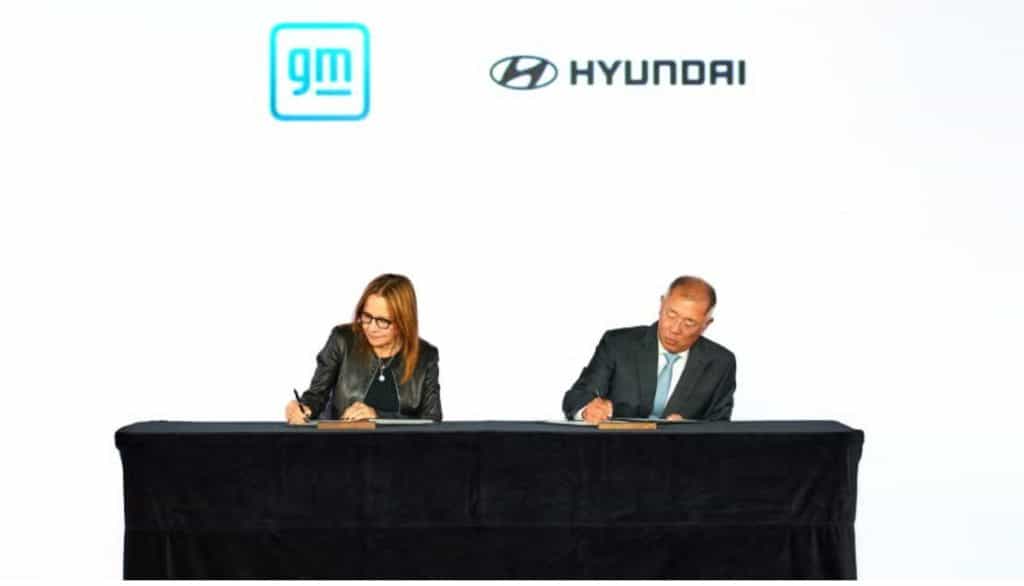
The five vehicles span both light-duty and commercial segments and are designed to serve distinct regional needs. Four of the models—a compact SUV, a sedan, a compact pickup, and a mid-size pickup—are being developed specifically for Central and South American markets. These vehicles will be built with flexible platforms that can support either internal combustion engines or hybrid propulsion systems. The fifth vehicle, a fully electric commercial van, is intended for the North American market and will be manufactured in the United States.
Together, Hyundai and GM project that these co-developed models could reach annual sales of more than 800,000 vehicles once full-scale production is achieved. Initial engineering, platform development, and design work are already underway, with vehicle launches anticipated to begin in 2028.
Under the terms of the collaboration, the two automakers will split development responsibilities according to their respective strengths. GM will take the lead in engineering the mid-size pickup truck platform, while Hyundai will oversee the development of the compact passenger vehicle line and the electric commercial van. Although the vehicles will be built on shared architectures to drive efficiency and cost-effectiveness, they will be customized with brand-specific interior and exterior designs to maintain brand differentiation and consumer loyalty.
Hyundai Motor Company President and CEO José Muñoz emphasized the broad impact of the partnership, saying, “Hyundai’s strategic collaboration with GM will help us continue to deliver value and choice to our customers across multiple vehicle segments and markets. Our combined scale in North and South America helps us to more efficiently provide our customers more of what they want—beautifully designed, high-quality, safety-focused vehicles with technology they appreciate.”
Shilpan Amin, GM’s senior vice president and global chief procurement and supply chain officer, echoed the sentiment and highlighted the targeted market opportunity: “These vehicles are focused on the most competitive and highest-volume segments in the Latin American markets, as well as the high-demand commercial segment in North America. By partnering together, GM and Hyundai will bring more choice to our customers faster, and at lower cost.”
In addition to the product development initiatives, the collaboration also encompasses shared procurement and logistics strategies. The companies will engage in joint sourcing of materials, components, transport solutions, and complex vehicle systems. Both GM and Hyundai have committed to exploring sustainable sourcing practices as well, including efforts to reduce carbon emissions in steel and other key materials used in vehicle production.
The joint electric commercial van, expected to begin U.S. production around 2028, reflects both companies’ ongoing commitments to electrification and commercial fleet innovation. With governments and private sector fleets increasingly shifting toward zero-emission solutions, the van is expected to play a central role in GM and Hyundai’s broader electrification strategies.
The partnership also serves as a platform for further exploration of advanced propulsion systems. Hyundai and GM have agreed to evaluate additional joint initiatives across a wide range of powertrain technologies, including internal combustion, hybrid-electric, battery-electric, and hydrogen fuel cell systems. Discussions are also ongoing regarding the potential for additional co-developed vehicles in other global markets, reinforcing the depth and flexibility of the alliance.
The September 2024 framework agreement that established the collaboration has quickly evolved from planning to execution, as both automakers seek to respond to changing consumer preferences, stricter regulatory requirements, and accelerating competition from both legacy automakers and emerging startups.
For Hyundai, the collaboration represents an opportunity to expand its footprint in the Americas while leveraging GM’s longstanding presence and expertise in the region. For GM, Hyundai’s growing technology portfolio, particularly in electrification and hybrid systems, provides added momentum as the company transitions toward a more sustainable and software-driven product line.
As the automotive industry continues to consolidate around strategic alliances to meet the capital-intensive demands of the electric and connected era, the Hyundai-GM partnership stands out for its balance of regional focus, complementary strengths, and global ambitions. Further announcements are expected as the companies move toward prototype testing and final development phases in the coming years.